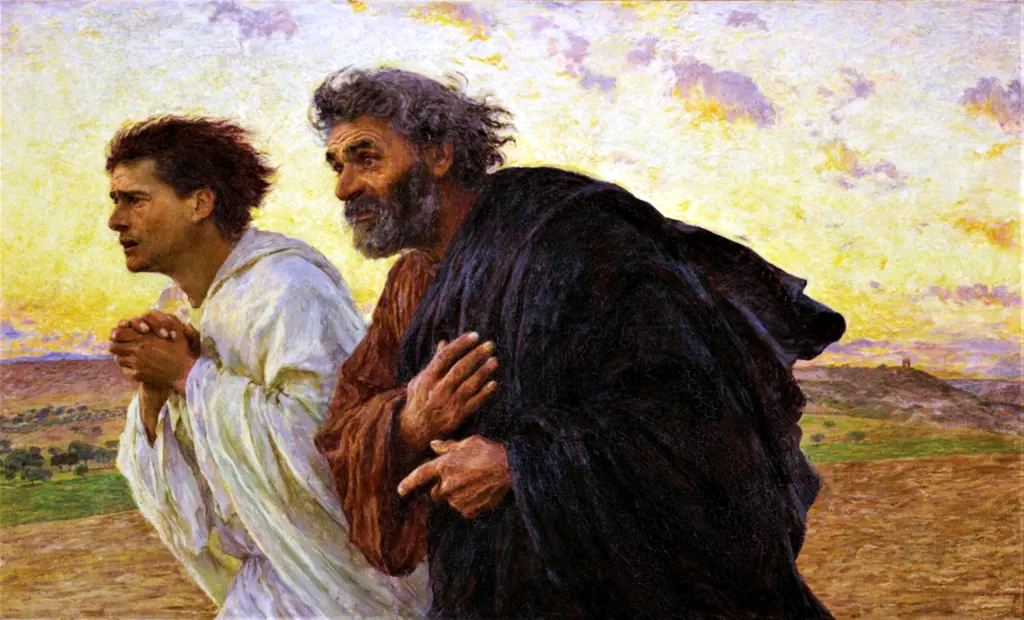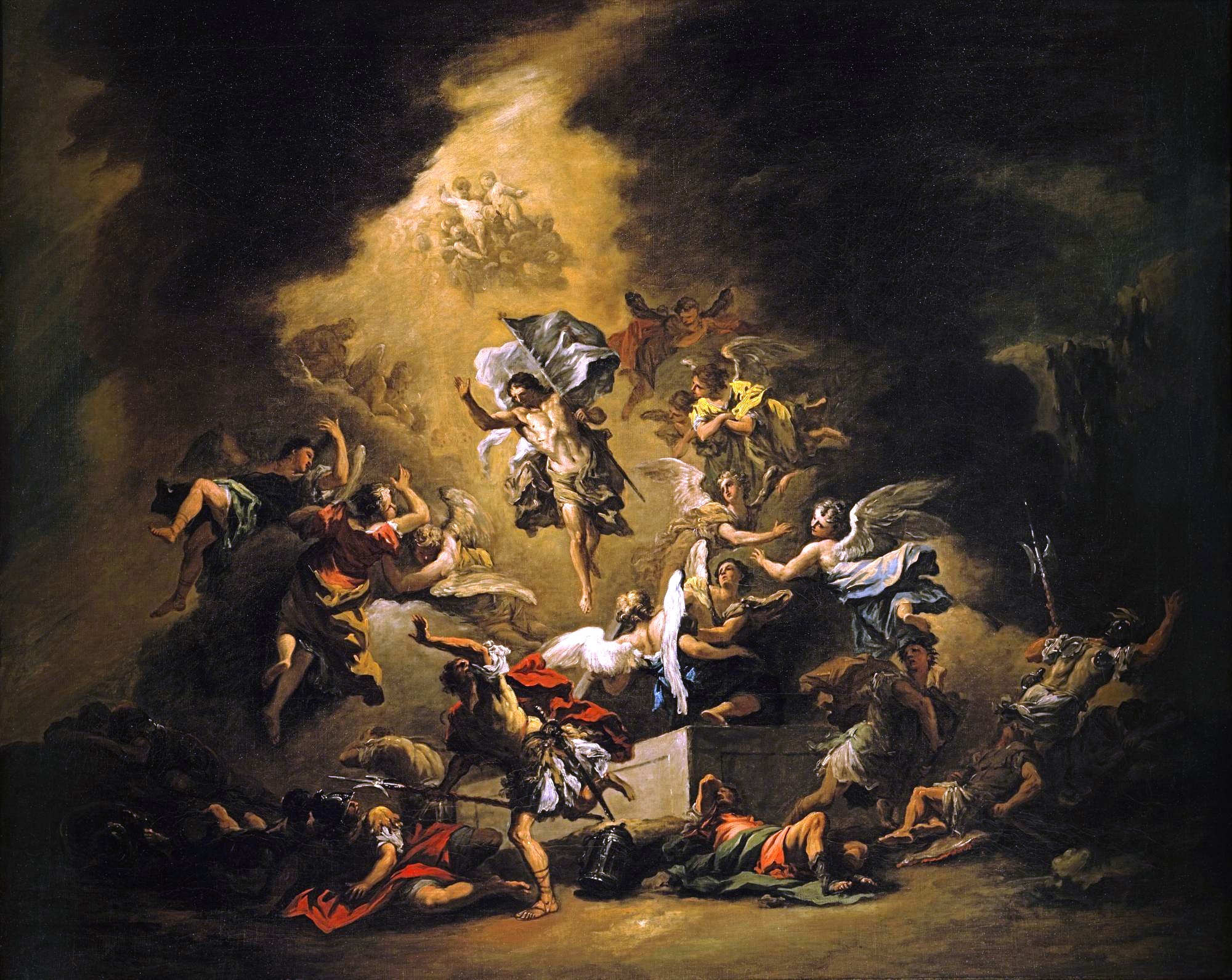Translation of the Epistle for the Feast of Easter
Brethren, purge out the old leaven, that you may be a new paste, as you are unleavened: for Christ our Pasch is sacrificed. Therefore let us feast, not with the old leaven, nor with the leaven of malice and wickedness, but with the unleavened bread of sincerity and truth.
Continuation of the Holy Gospel According to Matthew
And in the end of the sabbath, when it began to dawn towards the first day of the week, came Mary Magdalen and the other Mary, to see the sepulchre. And behold there was a great earthquake. For an angel of the Lord descended from heaven, and coming, rolled back the stone, and sat upon it. And his countenance was as lightning, and his raiment as snow. And for fear of him, the guards were struck with terror, and became as dead men. And the angel answering, said to the women: Fear not you; for I know that you seek Jesus who was crucified. He is not here, for he is risen, as he said. Come, and see the place where the Lord was laid. And going quickly, tell ye his disciples that he is risen: and behold he will go before you into Galilee; there you shall see him. Lo, I have foretold it to you.
The Saving Words of the Gospel.
Transcription of Sermon
In the Name of the Father, the Son, the Holy Ghost. Amen.
With the celebration of the Easter Vigil, we bring Lent to an end and begin the new season undergoing a certain transformation which comes about as a result of these paschal mysteries. And nonetheless, we can sometimes end our Lent and begin Easter with a certain disappointment, perhaps not so happy with ourselves according to our lack of generosity in Lent. We wish we could have done more. Well, not to worry, we have Easter in front of us and Lent was just preparation for that.
We are celebrating the Resurrection of Our Lord, and this is not the first rising from the dead that we see in Scripture. Our Lord raised the daughter of Jairus, the son of the widow of Nain, and Lazarus, his friend, things that only God can do. And nonetheless, the Resurrection of Christ is nothing like those. This is not a mere raising of a corpse along the same lines as those other miracles. All of the aforementioned went on to live earthly lives again. I don’t doubt that their lives were radically altered after their death experience. Nonetheless, they died again. They experienced the divorce of body and soul. So, we have to make certain distinctions between Christ’s raising of others from the dead to perdure in earthly life and His own resurrection. They are not comparable.
Our Lord, after His resurrection, did not continue a normal biological life obeying the laws of human nature. He wouldn’t have to die again like the people that He raised from the dead. Also, He’s not a ghost. He’s not a spirit. This isn’t a sort of visitation from the realm of the dead that reveals itself amongst the living. Further, this is not merely a mystical experience of those who saw the risen Lord. A mystical experience is something that momentarily draws our soul out of the things of this world to experience things divine. A mystical experience is temporary. It’s a suspension of certain cognitive powers. This is not like that. Paul experienced both of those things. He had his own mystical experiences in which he was raised to the Third Heaven. And nonetheless, that was an interior experience not comparable to his encounter with the risen Lord on the way to Damascus. That was an encounter with a Person outside of him.
So, what can we say, then, about the Resurrection of Christ? Doubtlessly, it is a historical event, much like the Incarnation, the Birth, and the Crucifixion. But unlike those events, there is something that transcends history in His resurrection. It remains outside of space and time and nonetheless invades space and time. The matter of Christ’s Sacred Humanity is changed. He changes it. As Tertullian says, in his writing on the Resurrection, he says, as a result of the Resurrection, blood and spirit have a place in God. Even though our souls, and we know this from philosophy that our souls are created for immortality, the Resurrection of Christ and our invitation to participate in it, then gives a new sense to bodiliness. We are no longer slaves of the Old Man. We are no longer to live according to the old leaven of malice and wickedness, as Paul says, but as new men risen up in Christ.
And this is what St. Paul speaks about in his prison letters, when he speaks of his membership, your membership, in the Mystical Body whose Head is Christ. It’s a risen body. It’s an indestructible body. It’s definitive, it’s full, it will never die again. And so, it’s important to underline the difference between the raising of these other people and this Resurrection of Christ which also ought to be our story as well. With the Resurrection, everything is made a new creation; the human body, it’s a new creation. Christ is the New and the Last Adam, who has become a life-giving spirit for us.
Jude Thaddeus asked our Lord in the Last Supper, “Why are you going to reveal yourself to us and not everyone?” This is a fundamental question for us because of the truth of the Resurrection and the nature of the Church: That our Lord has chosen certain ones, certain women, certain men, to be witnesses of this event, and then, as a result of it, to preach the truth of Christ. So, notice how our Lord wants to work through human agents. This is His plan for you, His plan for the Church. He wants to work through human agents. He could have manifested Himself. He could have told Jude Thaddeus, “I will reveal myself to everyone”, but our Lord, because of His charity, chose to reveal Himself to a few so that those few would have a radical participation in His saving mission. And the credibility of the Resurrection then, to a great extent, is going to be dependent on how configured those few are with Christ Himself.
Back to our Lent, whether it was generous or not so generous. Back to our own situation. What does this all mean for us? We can find all sorts of inadequacies in ourselves; we can find all sorts of neglect. Things that we know do not give our Lord glory in our lives, and they don’t have to have the last word. If we truly believe in the transforming action of grace, if we truly believe in the Resurrection, and that each one of us has received an invitation to it, then we have to throw off the Old Man, and this is a daily project to be converted constantly; to not become complacent.
How convincing am I? This is something each one of us can ask. How convincing am to the world of the truth of the Resurrection of Christ? Do my thoughts, the way I treat people and think, do they reveal Christ Risen, or is there something still that is not touched by, not transformed by, this all-important fact of the Resurrection of Christ? As Paul says, we have become new men in Christ, and to be new is to be made anew. Behold, I make all things new, says our Lord in the Apocalypse. We can see the action of the Mass and not have any doubts about the Transubstantiation, the miracle of the Eucharist. We can read the lives of the saints and not have any doubts about the wonders that they performed thanks to our Lord’s working through them. Nonetheless, we can find that our trust in our Lord finds a wall when it comes to ourselves. Perhaps we know our own weakness and our own history, and we don’t really believe that we can be good, that we can be saints. And nonetheless, the Resurrection is proof that it is possible. Our Lord doesn’t set us up for failure. He invites us to participate in His very life. And so, the question again is, my thoughts, my words, my actions, my attitudes, the things I think about my plans, my desires, do they come from Christ Risen? Do they lead to Christ risen?

The Disciples Peter and John Running to the Sepulchre on the Morning of the Resurrection, Eugène Burnand, 1898
If we have found things that are inadequate things that do not measure up to Christ in us, and I’m sure each one of us can say yes to that, that’s not the problem. The problem is when I don’t continue my conversion. And so, if we had Lent as a time of penance and prayer, almsgiving, a time of reparation, we have Easter as a time to make that Lenten Season fruitful now. By living according to those same truths of prayer, penance, almsgiving, of dying to oneself, so that Christ can make us new.
In the Name of the Father, the Son, the Holy Ghost. Amen.
— Fr. Ermatinger


